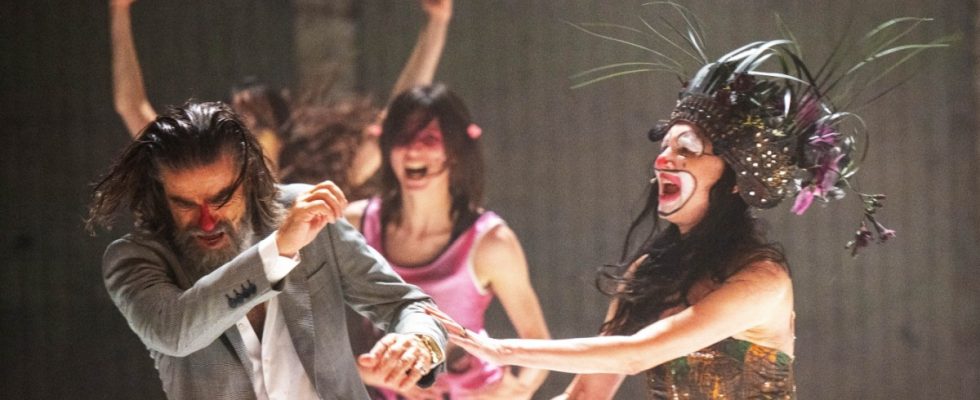The Brussels-based Needcompany, founded by the visual artist Jan Lauwers together with his wife, the choreographer Grace Ellen Barkey, is one of the oldest (since 1986!) and best-established brands in independent theatre. Lauwers initially made a name for himself with cool understatements; in his production of Shakespeare’s “Antony and Cleopatra” (1992), for example, the death of a character was indicated simply by the actor in question walking off the stage.
Lauwers has kept his casual, brash approach, but at least since the global success of the moving Needcompany musical “Isabella’s Room” (2003) it’s obvious that the director no longer has a problem with entertaining in a completely uncool way. In the new Needcompany production “Billy’s Joy”, which premiered at the Vienna Festival Impulstanz in the Academy Theater, Lauwers once again uses his favorite author. “Billy” stands for William Shakespeare, “Joy” for his collected comedies.
The play is the sequel to ‘Billy’s Violence’ (2021), in which tragedy was the theme. In both cases, the texts are not by Jan Lauwers (and only marginally from Shakespeare), but by Victor Afung Lauwers. The 32-year-old son of Lauwers and Barkey founded a group himself (Kuiperskaai Collective) in 2010 and joined the family business after it disbanded.
Some of the most complex works in theater history in just under two hours
For “Billy’s Violence” (the previous piece could also be seen at Impulstanz), Victor Lauwers condensed ten Shakespearean tragedies into ten couple scenes, from “Othello” to “Macbeth”, from “Hamlet” to “King Lear”. To want to pack some of the most complex, most canonical works in the history of theater into a two-hour evening is of course chutzpah; but sometimes impudence wins in the theater too. In fact, there are partial successes like a totally kinky, very funny “Romeo and Juliet” scene; overall, however, “Billy’s Violence” is nothing more than the Need Company version of the Stadttheater joke “The Complete Works of Shakespeare (slightly abridged)” that was played around 2000.
In the new play, Victor Lauwers has now taken on the comedies, but this time he has proceeded in a less schematic way. In the course of the 95 minutes, a good dozen play titles are mentioned – from “What You Want” to “As You Like It”, from “The Taming of the Shrew” to “Comedy of Errors”, from the “Merry Wives of Windsor” to to the “Merchant of Venice”, which formally also belongs to the comedies – but that is mainly name dropping, most of the plays mentioned are not even alluded to. “Billy’s Joy” is not a collage of different comedy scenes, but one big meta-comedy based on Shakespearean motifs; If need be, a Karl Marx quote is included in between.
The best point is in the programme, where Victor Lauwers is quoted as saying: “The essential difference between Shakespeare’s tragedies and his comedies is that the comedies are not funny.” The atmosphere of the performance is still rather cheerful, if only because that’s always the case in Needcompany performances. “Billy’s Joy” is set in a fairyland, an amalgam of all the fantasy forests and magic islands in and on which the Shakespearean comedies are set. Nothing of this can be seen, of course, the stage is almost empty, but at least the eight performers are equipped with pointy elf ears, oversized clown shoes, donkey masks and flower crowns. The figures can hardly be clearly assigned; only two names known from Shakespearean comedies appear, the elf king Oberon (Gonzalo Cunill) from “A Midsummer Night’s Dream” and the witch Sycorax (Grace Ellen Barkey) from “The Tempest”. On the other hand, Snow White (Meron Verbelen) by the Brothers Grimm and the tragedy couple Romeo (Nao Albet) and Juliet (Romy Louise Lauwers) also hang out in Lauwers’ fairytale land; The latter is now called Eden, however, because the name Julia was “too prudish” for her.
Martha Gardner plays a little bit of Slip and a little bit of Caliban, but mostly herself (“I’m the only Brit here and I can play any role!”); Juan Navarro plays a bear named Pourquoi, who enters the scene with a quote from Hamlet (“Should I eat her or not – that’s the question!”) and spend the rest of the evening retreating to the hearth of the garden kitchen, the stands on the right edge of the stage. Maarten Seghers, who is responsible for the music at the Needcompany, also plays a kind of emcee named Fluido. Surprisingly, however, the play is not at all interested in the fluid gender identities that are commonplace in Shakespearean comedies; instead, Fluido once complains that people have lost the ability to tell a story with a beginning, middle and end.
“Something is rotten in fairyland!” says Victor Lauwers. That’s why “Billy’s Joy” no longer has a classic story to offer. The fact that some scenes seem a bit unfinished is probably not intentional, but it seems plausible that the final scene is interrupted: The cannibal feast from the horror drama “Titus Andronicus”, in which a mother is served her sons who have been cooked into a pie, also has in nothing lost in a meta-comedy.

